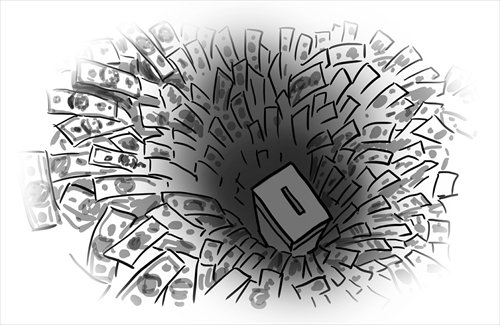Black money infiltrates Indian elections

Illustration: Liu Rui/GT
As India's political temperature rises with each passing day, the role of black money in elections is being highlighted.
With the ruling National Congress Party sharpening its attack on opposition candidate Narendra Modi for funding his campaign with huge amounts of black money, this critical but previously under-reported phenomenon has taken center stage.
India's 16th general elections, billed as the most expensive elections ever, are witnessing an unprecedented flow of black money into country's electoral process. Analysts claim that a mammoth 400 billion rupees ($6.64 billion), roughly 0.35 percent of India's GDP, has been pumped into the democratic process.
Some observers link the black money surge to the stunning revival of the stock market. To them, foreign institutional investors' renewed interest in Indian stocks is nothing but illicit transactions made through legal routes to aid politicians.
There cannot be more credible evidence of black money flow than the truck loads of cash and liquors that the Election Commission of India (ECI) and its affiliated agencies have seized from various parts of India in the recent weeks.
So far, the ECI and its affiliated agencies have seized an unprecedented 2.6 billion rupees ($43 million) in cash meant to be distributed among voters.
With the electoral process increasingly monetized and political competition more intense than ever, there is a great rush among parties and candidates to outspend each other in the electoral fray.
Even as political parties scramble for every cent to fight and win elections, impoverished voters would like to be pampered during the election season.
Given traditional means of fund raising, especially through membership fees and selling coupons, have dried up considerably, political parties have gone on to look out for more fertile sources for fund raising.
With officials still retaining critical administrative discretions and regulatory arbitrage, businesses that want to profit from an economy still controlled largely by the state and its officials do not hesitate to part with funds for quid pro quo.
Sensational revelations about telecom and coal block allocations leave little to the imagination about the pernicious business-politics nexus in India.
In several instances, dubious companies have been witnessed competing with each other to fund political activities and even bankrolling entire election campaigns in some states.
The most immediate outcomes of this unholy nexus are crony capitalism and subversion of governance in the country.
The easy flow of unaccounted money is not only turning India's famed democracy to a plutocracy, it is driving a significant section of citizens to hate politics and politicians.
This trend was best exemplified in the stunning victory of the newly formed anti-corruption Aam Aadmi Party in recent Delhi elections.
Concerned over the corrosive influence of black money, the ECI has initiated a series of measures to curb the illicit money flow.
From laying out elaborate surveillance infrastructure, including flying squads, to setting up parallel accounting teams to track money flow in elections, the ECI has shown a measured response to tackling black money.
The ECI has also come out with the novel idea of setting up of a central helpline to aid willing whistle-blowers to alert its personnel on any such illicit transactions.
Yet the results are not very encouraging. The ECI has seized only a fraction of the money involved, and it lacks the adequate legal and institutional backing to clean the Augean stables of Indian democracy.
When it comes to fighting black money and cleaning up campaign finance, India's most fractious political parties have shown rare unity. This is probably the single issue on which all political parties have shown unusual unity in their opposition to funding reforms.
Whatever progress has come in terms of setting up transparency, these have largely been possible due to a proactive judiciary and civic activism. However, these measures do not fundamentally address the structural crisis facing Indian democracy.
The author is a senior fellow with the Observer Research Foundation, New Delhi. opinion@globaltimes.com.cn